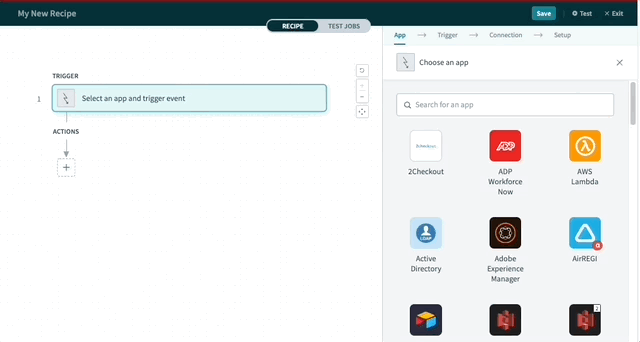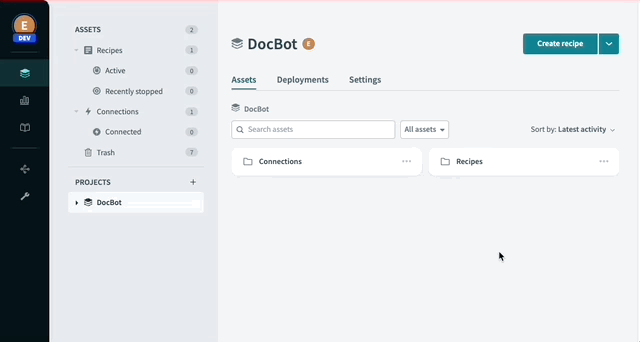- 05 Feb 2025
- 3 Minutes to read
- Print
- PDF
Connections
- Updated on 05 Feb 2025
- 3 Minutes to read
- Print
- PDF
Connections
A connection authorizes a recipe to interact with apps like Salesforce and Zendesk through triggers and actions. Connections are reusable, allowing you to use the same connection across multiple recipes.
When you start building a recipe, the first step is establishing a connection between Integration Hub and an app.
Each connection is associated with one instance of the app, such as a user account, and can be re-used across recipes.
 Salesforce and Zendesk connections from the recipe view
Salesforce and Zendesk connections from the recipe view
Who can create connections?
To create connections, you need the Create Connections Privelege
.How does Integration Hub access my connections?
Integration Hub typically uses the app's authorization/authentication API to establish the connection, using one of the following methods:
- OAuth 2.0
- OAuth 1.0 (and variations)
- Basic authentication (username and password)
- API key or secret
As part of this step, you provide Integration Hub with the permission to access data from the app. The permissions granted to Integration Hub usually correspond with those of the user authorizing the app.
What data can Integration Hub access in my connections?
Integration Hub can only access the same data the user authorizing the connection has access to.
For example: If you only have access to view accounts in Salesforce and you create a Salesforce connection in Integration Hub. It will only be able to view accounts.
#Creating a dedicated user for Integration Hub
Creating a dedicated app user for Integration Hub ensures that recipes aren't dependent on the account of a human user. If someone leaves the company, recipes will continue to run.
Additionally, creating a dedicated Integration Hub user allows you to tailor the permissions Integration Hub has in the app, thereby reducing security risk.
Apps have different granularity when it comes to defining user roles and permissions.
#Using sandbox credentials for development
When developing and testing recipes, we recommend using sandbox (or non-production) credentials for your connections. Using test data during development ensures that live data isn't accidentally altered.
Creating connections
There are two ways to connect apps in Integration Hub:
- In the recipe editor
- In the connection wizard
#In the recipe editor
To add a connection while in the recipe editor:
- In the recipe editor, click an app from the side menu.
- Click the trigger or action you want to use.
- Follow the prompts and setup guide for the app.
<update screesnhot>

#In the connection wizard
You can access the connection wizard from a few places in Integration Hub:
- Resources > Connections > Create connection
- Resources > Recipes > Create connection
- Any project > Create connection
<update screenshot>

#Using connections in recipes
- Multiple app instances, one recipe
- Runtime user connections
Note: Before triggers and actions can be configured in recipes, valid connections to apps must be established.
#
Multiple app instances, one recipe
Typically, you'll have one or two instances of an app - one for production and perhaps another for testing. In a scenario like this, you'd likely need one connection to use across multiple recipes.
When you have multiple instances of an app, multiple connections should be created in Integration Hub. Each connection should authenticate to each instance of the app.
Most connectors only allow one connection per app, per recipe.
Runtime user connections
By default, recipes perform actions based on the credentials used to authorize the connection. However, by using the Runtime user connection feature, you can swap out connections when a recipe runs.
For example: Let's say you have a recipe that creates opportunities in Salesforce. The Salesforce connection currently uses a Sales Manager's credentials. Even though other sales reps are creating opportunities, all opportunities will show as created by the Sales Manager.
Note: The Runtime user connections feature is only available in callable recipes
Connection errors
On occasion, app connections can become invalid. These are the most common reasons:
Modified credentials
If credentials were changed in the app and not in Integration Hub, the connection may become invalid.
Insufficient permissions
In this case, the user authorizing the connection doesn't have the permissions to access required data or perform certain actions.
If you encounter an invalid connection error, follow the below guidelines:
Verify the authorizing user's permissions
Verify that the user who is authorizing the connection has sufficient permissions.
Verify that the connection's credentials are correct
Double-check that the password, API key, etc. is entered correctly.
Re-authorize the connection
If you've verified the user's permissions and credentials, try re-connecting the connection.

